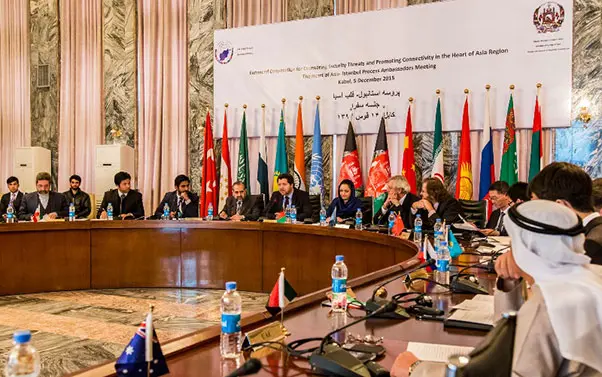The ministerial conference of the Heart of Asia - Istanbul Process concluded here Wednesday on a positive note as Pakistan and India agreed to resume official dialogue after nearly nine years' hiatus.
The Composite Dialogue was suspended following the 2008 deadly attacks in the Indian commercial hub of Mumbai.
The media in Pakistan and India has viewed the agreement on the revival of the Comprehensive Dialogue that will cover all outstanding issues as a major "breakthrough."
"Both sides agreed to a Comprehensive Bilateral Dialogue," Indian External Affairs Minister Sushma Swaraj told a news conference along with Pakistan Foreign Affairs Adviser Sartaj Aziz late Wednesday.
The two sides have "directed" their top diplomats "to work out the modalities and schedule of the meetings under the Dialogue," a joint statement said.
Key issues include peace and security, economic and commercial cooperation, counterterrorism. Narcotics control and humanitarian issues, people to people exchanges and religious tourism will also be part of the dialogue.
All previous attempts to bring the dialogue on track had failed and the skirmishes along the Line of Control in disputed Kashmir in recent months have heightened tensions.
Bilateral and trilateral meetings on the sidelines of the Heart of Asia conference assumed more importance than the meeting's proceedings that were also very useful to evolve consensus on a push to find solutions to conflicts through peaceful means.
The breakthrough has widely been hailed in Pakistan and India in the media. The international community has also welcomed the development.
Credit of this breakthrough goes to Prime Minister Nawaz Sharif and his Indian counterpart Narendra Modi whose recent brief handshake and chat on the sidelines of the climate change conference in Paris paved the way for the major achievement.
Friendly countries have also encouraged the nuclear rivals to sit down and find a solution through dialogue.
Similarly, there were positive signals of an end to the months of deadlock in the incessant peace negotiations between the Afghan government and the Taliban.
Afghan Foreign Minister Salahuddin Rabbani said Kabul has agreed to restart dialogue with a "reconcilable" Taliban.
"At the trilateral and bilateral meetings we had this afternoon, the main discussion item has been the peace process in Afghanistan.
"Our allies agreed to work with us in this regard ... to bring the reconcilable elements to the table," Rabbani told a news conference in Islamabad on Wednesday.
The first ever face to face Pakistan-brokered Afghan talks were cancelled in late July after the death of the Taliban leader Mullah Omar was revealed.
 简体中文
简体中文

